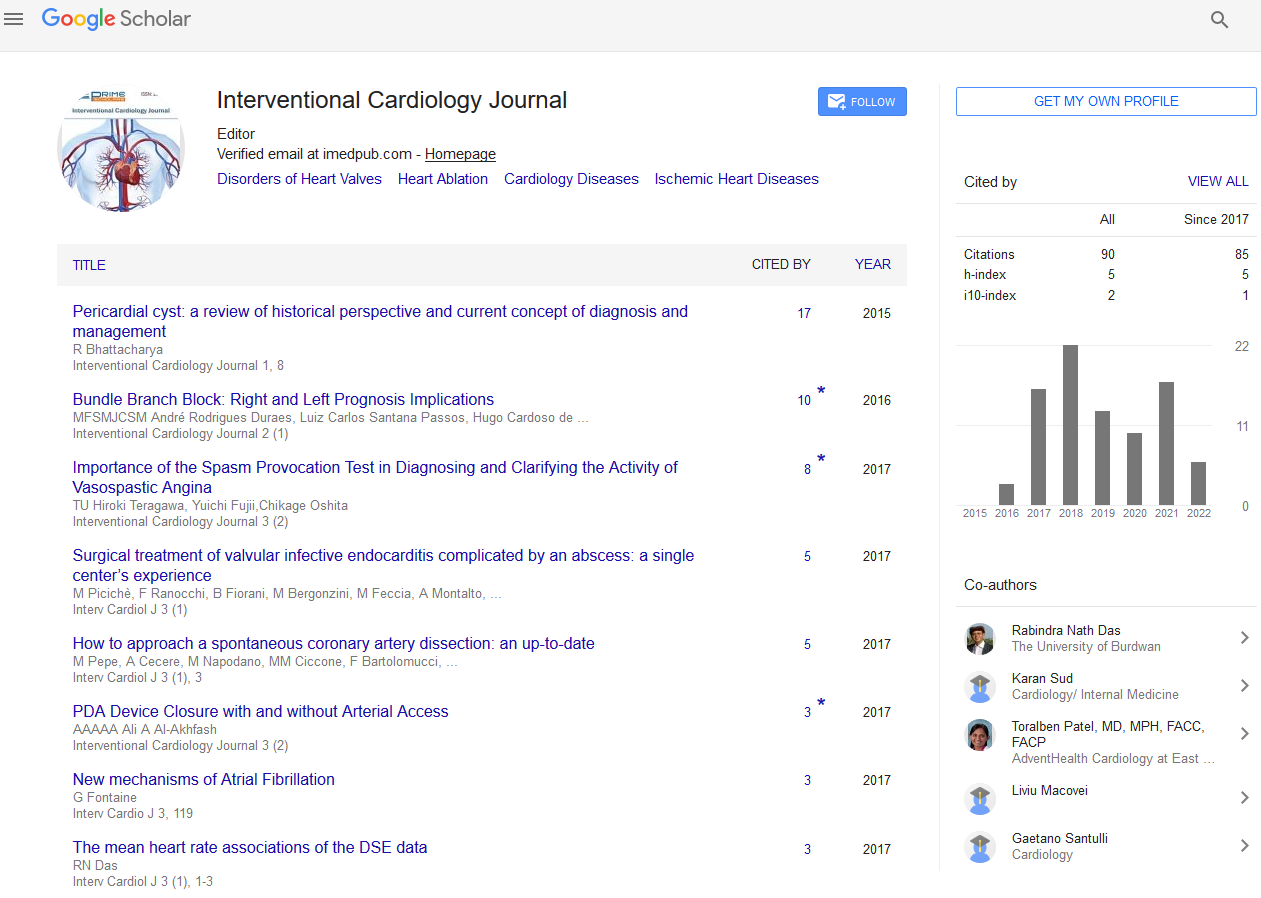Opinion - (2024) Volume 10, Issue 8
Comprehensive Management Strategies for Chronic Heart Failure: Advances, Challenges, and Future Directions
Zhang Ethan*
Department of Cardiology, Johns Hopkins University, United States
*Correspondence:
Zhang Ethan,
Department of Cardiology, Johns Hopkins University,
United States,
Email:
Received: 31-Jul-2027, Manuscript No. ipic-24-21251;
Editor assigned: 02-Aug-2024, Pre QC No. ipic-24-21251 (PQ);
Reviewed: 16-Aug-2024, QC No. ipic-24-21251;
Revised: 21-Aug-2024, Manuscript No. ipic-24-21251 (R);
Published:
28-Aug-2024, DOI: 10.21767/2471-8157.10.08.77
Introduction
Chronic heart failure is a prevalent and serious condition
characterized by the heart's inability to pump blood effectively
to meet the body's needs. This progressive disease affects
millions of people worldwide, leading to significant morbidity,
reduced quality of life, and increased healthcare costs. The
management of multifaceted approach that includes lifestyle
modifications, pharmacological treatments, and, in some cases,
advanced therapies. Despite advancements in treatment,
remains a challenging condition, necessitating ongoing
research and innovation to improve patient outcomes. The
cornerstone management is a comprehensive treatment plan
aimed at alleviating symptoms, improving functional capacity,
and slowing disease progression. Lifestyle modifications are
fundamental to managing. Patients are advised to adopt a
heart-healthy diet, reduce sodium intake, and engage in regular
physical activity tailored to their individual capabilities.
Description
Weight management and the cessation of smoking are also
crucial components of a comprehensive management strategy.
These lifestyle changes help mitigate fluid retention, reduce
the heart's workload, and enhance overall cardiovascular
health. Pharmacological treatment is central to managing
and includes several classes of medications. Angiotensinconverting
enzyme inhibitors are commonly prescribed to
reduce blood pressure and decrease the strain on the heart.
These drugs work by inhibiting the conversion of angiotensin
I to angiotensin II, a substance that constricts blood vessels
and raises blood pressure. Similarly, angiotensin II receptor
blockers offer an alternative for patients who are intolerant to
inhibitors, providing similar benefits in reducing blood pressure
and protecting heart function. Beta-blockers are another
critical component of management. These medications help
slow the heart rate, reduce myocardial oxygen demand, and
improve the heart's efficiency. For patients with advanced
or those who do not respond adequately to conventional
treatments, advanced therapeutic options may be considered.
Cardiac resynchronization therapy is a specialized form of
pacemaker therapy that improves the coordination of the
heart's contractions, enhancing its efficiency and relieving
symptoms. Similarly, implantable cardioverter-defibrillators
are used in patients at high risk of sudden cardiac death due
to life-threatening arrhythmias. These devices continuously
monitor the heart's rhythm and deliver shocks if a dangerous
arrhythmia is detected.
Conclusion
Despite the progress in management, challenges remain,
including the need for personalized treatment approaches
and addressing the socioeconomic factors affecting patient
adherence to therapy. Ongoing research aims to better
understand the underlying mechanisms, develop novel
therapies, and refine existing treatment strategies. The goal
is to improve patient outcomes, reduce hospitalizations, and
enhance the overall quality of life for individuals living with this
chronic condition. In summary, chronic heart failure is a complex
and challenging condition that requires a comprehensive
and individualized management approach. Advances
in pharmacological treatments, lifestyle modifications,
and innovative therapies have significantly improved the
management yet ongoing research and advancements are
crucial for addressing the remaining challenges. By continuing
to explore new treatment options and optimizing care
strategies, the medical community aims to enhance the lives
of patients affected by chronic heart failure and reduce the
burden of this debilitating disease.
Citation: Ethan Z (2024) Comprehensive Management Strategies for Chronic Heart Failure: Advances, Challenges, and Future
Directions. Interv Cardiol J. 10:77.
Copyright: © 2024 Ethan Z. This is an open-access article distributed under the terms of the Creative Commons Attribution
License, which permits unrestricted use, distribution, and reproduction in any medium, provided the original author and source
are credited

